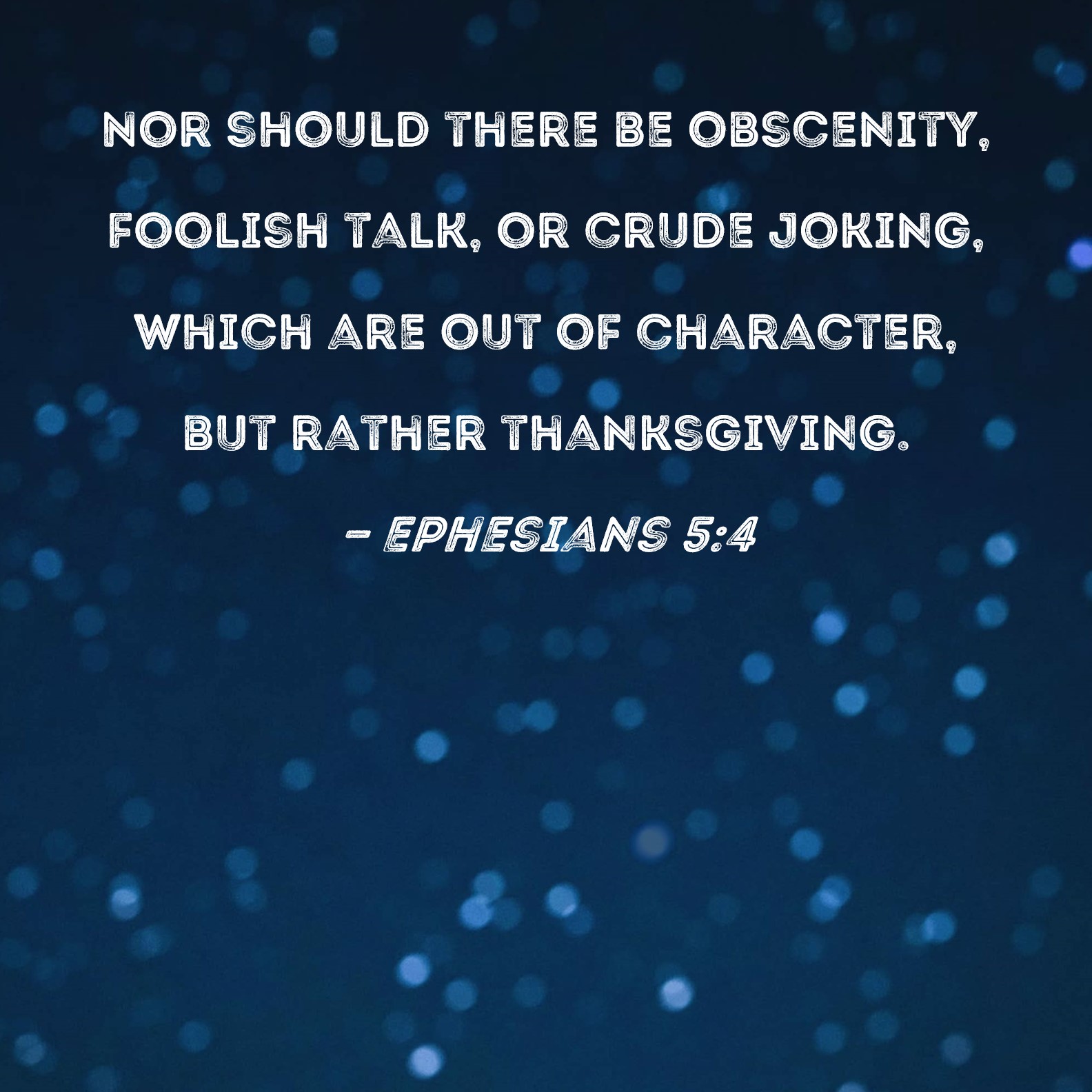What Does the Bible Say About Jokes
The Bible discourages filthiness, foolish talk, and crude joking, and instead encourages thanksgiving. Joking, in general, is not regarded as a sin but we should be mindful of the type of jokes we engage in.

Credit: www.gotquestions.org
What Does The Bible Say About Jokes?
The topic of jokes and humor is an interesting yet sometimes controversial one in Christian circles. The Bible doesn’t explicitly mention jokes, but it contains principles that guide our speech and conduct. Understanding the Christian perspective on jokes is essential to discerning the biblical view on this topic.
Understanding The Christian Perspective
From a Christian perspective, humor can be a positive and enjoyable aspect of life, reflecting the joy and creativity instilled in humans by God. However, it’s crucial to ensure that humor resonates with biblical values and doesn’t undermine spiritual principles.
Biblical Warnings Against Foolish Talk And Jesting
The Bible warns against foolish talk and jesting in Ephesians 5:4, where it emphasizes the importance of edifying speech. Proverbs 10:19 also highlights the perils of speaking without discretion, which can potentially include inappropriate jokes. These admonitions encourage believers to use discernment in their words and humor.
The Importance Of Thanksgiving
Thanksgiving is a recurring theme in the Bible, promoting gratitude and positivity. While jokes can be a form of light-hearted expression, it’s essential that they don’t diminish thankfulness or offend others. The balance between humor and respectful, uplifting speech is crucial within the Christian context.

Credit: biblehub.com
Is Joking A Sin?
Joking is a common form of communication and a way to bring humor into our lives. But what does the Bible say about joking? Is it considered a sin? Let’s examine different interpretations, the role of intent and context, and how to determine what jokes may be inappropriate.
Examining Different Interpretations
When it comes to joking, there are varying interpretations among Christians. Some believe that joking itself is not regarded as a sin, as laughter and humor are gifts from God that can bring joy and lighten one’s spirit. However, others caution against jokes that may be offensive, vulgar, or disrespectful.
In Ephesians 5:4, the Bible advises believers to “Let there be no filthiness nor foolish talk nor crude joking, which are out of place, but instead let there be thanksgiving.” This verse suggests that certain types of joking may be inappropriate and should be avoided. It is important to consider the impact of our words and ensure they align with biblical principles.
The Role Of Intent And Context
When evaluating joking as a potential sin, it is crucial to consider the intent behind the joke and the context in which it is made. Proverbs 26:18-19 warns, “Like a maniac who shoots deadly firebrands and arrows, so is the man who deceives his neighbor and says, ‘I am only joking!'” This verse highlights the importance of using discernment and avoiding deceptive or harmful jokes.
Intent plays a significant role in determining whether a joke crosses the line into sin. Jokes that intentionally belittle, mock, or harm others are contrary to the biblical principle of loving our neighbors as ourselves. Therefore, it is essential to ensure that our jokes are based on kindness, respect, and edification.
Determining Inappropriate Jokes
To determine whether a joke is inappropriate, we can refer to Philippians 4:8, which instructs believers to focus on what is true, honorable, just, pure, lovely, commendable, excellent, and praiseworthy. If a joke aligns with these qualities, it is likely acceptable. However, jokes that promote unrighteousness, encourage immorality, or bring harm to others should be avoided.
In addition to considering the content of a joke, we must gauge the impact on others. If a joke causes someone to stumble, feel hurt, or goes against their Christian values, it should be refrained from. As followers of Christ, it is our responsibility to uphold love, understanding, and unity within the body of believers.
In conclusion, while joking itself is not regarded as a sin, Christians should exercise caution in their choice of jokes. It is essential to examine different interpretations, consider intent and context, and determine whether a joke aligns with biblical principles. By doing so, we can ensure that our jokes bring joy, edify others, and honor God.
Can Christians Engage In Humor?
In the Christian life, joy and laughter are often associated with happiness and positive emotions. Humor can be a way to connect with others, bring levity to difficult situations, and alleviate stress. However, when it comes to jokes, Christians should be mindful of the content and context. It is important to understand God’s perspective on humor and ensure that our jokes align with biblical principles. In this article, we will explore what the Bible says about jokes and how Christians can engage in humor in a way that is pleasing to God.
Understanding God’s Sense Of Humor
Many people wonder if God has a sense of humor. While the Bible does not explicitly state that God laughs or makes jokes, it does reveal aspects of His character that indicate a lighthearted and joyful nature. For example, God created humans with the ability to experience humor and laughter, which suggests that He values these emotions. Additionally, the Bible describes moments of irony and unexpected outcomes that can be seen as humorous. Understanding that God appreciates laughter can help Christians approach humor with a positive mindset.
The Role Of Comedy In Christian Life
Comedy can serve as a powerful tool in the Christian life. It can help build relationships, bring people together, and even convey important truths in an engaging manner. Jesus often used parables and wit to teach His followers valuable lessons. Similarly, Christian comedians use their talents to lighten hearts and spread laughter while sharing messages rooted in faith. Laughter can provide a refreshing break from the challenges of life, and comedy can be a way to bring joy and encouragement to others.
The Line Between Appropriate And Harmful Jokes
While humor has its place in the Christian life, it is essential to discern between appropriate and harmful jokes. Christians are called to speak words that are uplifting and edifying, avoiding anything that may cause harm or offend others. Ephesians 4:29 admonishes believers to let no corrupting talk come out of their mouths but only that which is good for building up others. This principle applies to jokes as well. Christians should refrain from jokes that involve profanity, slander, or demeaning others. Instead, we should seek to use humor to bring joy, encouragement, and unity to those around us.
In conclusion, Christians can engage in humor while honoring God and following biblical principles. By understanding God’s sense of humor, recognizing the role of comedy in the Christian life, and discerning between appropriate and harmful jokes, believers can use humor as a powerful tool for building relationships and spreading joy.

Credit: www.boredpanda.com
Frequently Asked Questions On What Does The Bible Say About Jokes
What Does The Bible Say About Laughing?
The Bible encourages laughter because it brings joy and is good for the heart.
Where In The Bible Does It Talk About Having Fun?
The Bible does not specifically mention having fun, but it does encourage enjoying life and finding happiness in eating, drinking, and the joys of life. It also advises against crude joking, filthiness, and foolish talk, emphasizing the importance of being respectful and thankful.
Is It A Sin To Mock Someone?
Mocking someone is not recommended according to the Bible. We should respect others and refrain from mocking them.
What Does Jesus Say About Mocking?
Jesus teaches us to treat others with kindness and respect, and to avoid mocking or crude jesting. In Ephesians 4:29, it is said, “Let no corrupting talk come out of your mouths. ” This promotes a spirit of gratitude and thanksgiving instead.
Conclusion
The Bible presents a balanced view of jokes, cautioning against crude jesting and promoting a spirit of thanksgiving. While it does not explicitly condemn lighthearted humor, it emphasizes the importance of using our words wisely. Ultimately, jokes should be used to uplift and encourage others, aligning with the biblical principles of love and kindness.













